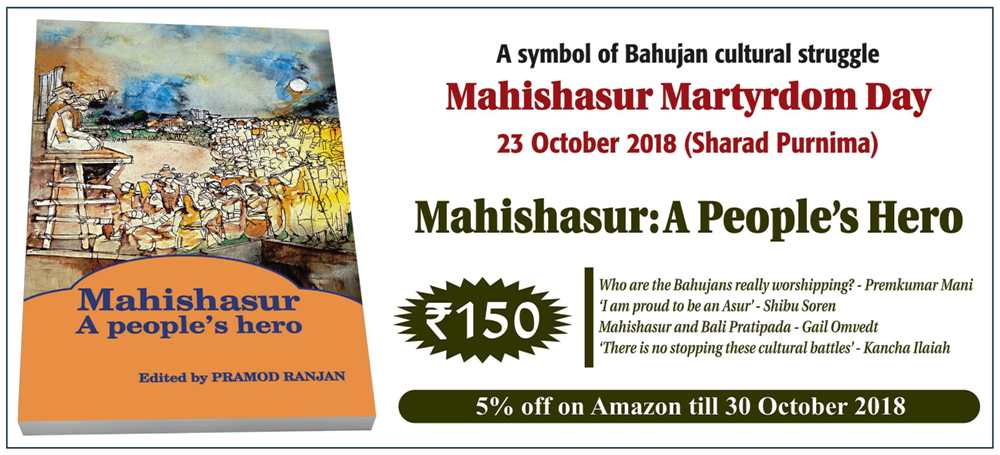The ‘Mahishasur’ movement is again gaining momentum in Chhattisgarh this year. The youths associated with the Gondwana Students Union in Pondi-Uprora in Korba district in the state, are creating awareness among the tribals about how their idols Asur Raj Mahishasur and King Ravana are insulted in the name of Hindu festivals and how this is tantamount to insult of their culture, history and ancestors. They want an end to these practices. It is worth mentioning here that last year, dozens of organizations had submitted memoranda to this effect to the local authorities in Madhya Pradesh, Chhattisgarh and Jharkhand. At some places, police complaints were also filed against holding of Durga Puja.
Tribal youth are organizing themselves again to protest such practices, which, they believe, are derogatory to them and their ancestors. They assert that they do not have any problems with Hindus worshiping Durga and Ram. However, they will not tolerate the portrayal of the killing of Asur Raj Mahishasur and burning of the effigies of King Ravana. For the past few years, tribals, dalits and the OBCs have been protesting against Mahishasur Vadh and burning of the effigies of Ravana. Now this resistance is turning wider and intenser.
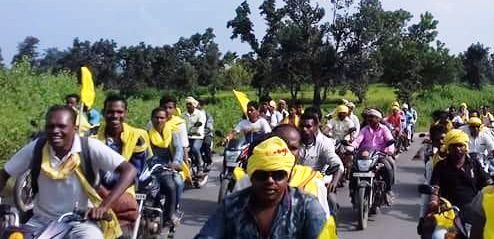
The protests have reached Korba in Chhattisgarh. The youths associated with the Gondwana Students Union handed over a memorandum to the district magistrate, demanding that neither the idols of Asur Raj Mahishasur should not be installed with Durga’s nor burning of Ravana’s effigy should be permitted. The district unit of the Union, constituted a few months ago, has already drawn a sizeable number of students, professionals and young peasants. The Gondwana Students Union, which champions the interests of the tribals, was formed in Madhya Pradesh in 2008.
The memorandum, submitted to the DM on 17 September, 2018, some days before the Durga Puja, says that, “Images of Mahishasur – a people’s hero – are displayed along with those of Durga to humiliate him and the effigies of Ravana – Gondwana emperor and ancestor of the tribals – are burnt as a symbol of evil. The original inhabitants of India – the tribals – have been venerating and worshipping them since time immemorial. As such, both the practices should be stopped altogether.”
Also read: Mahishasur: A People’s Hero
The memorandum was submitted to the DM office by Gondwana Students Union’s block convener Harishchandra Koram, Block vice-president Sanjay Markaam, District Vice President Ramkumar Shyam, Mukesh Kamro, Dil Bodh, Rajesh, Shatrughna Markaam, Bandhu Kanwar, Lalit Pawale, and Yogiraj Ayam.
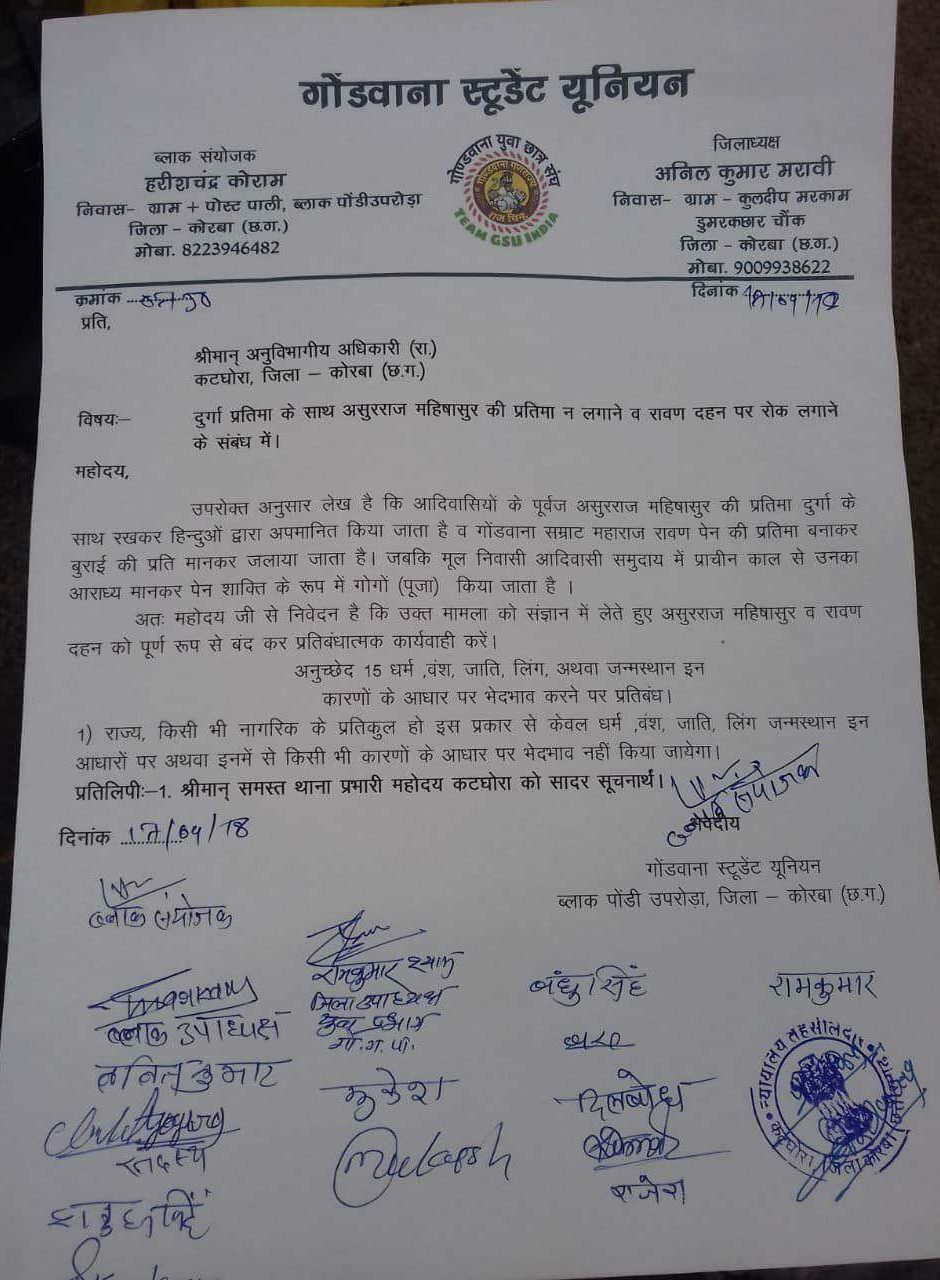
Harishchandra Koram, a shopkeeper by profession, says, “Tribal communities have been worshiping Mahishasur since ancient times as their ancestor. Every year, the display of his slaughter slanders him and hurts the sentiments of the tribals.”
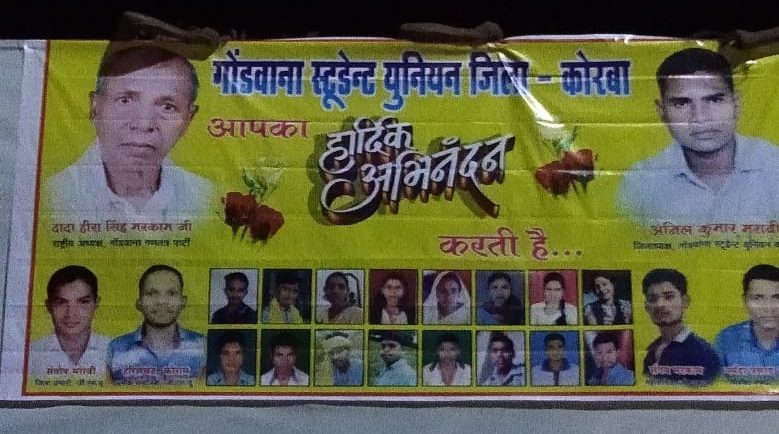
Under the leadership of the Gondwana Students Union’s district head Anil Kumar Marawi, a memorandum, addressed to the President of India, was also submitted to the tehsildar of Palli, Jagatram Shatranj, The Union has requested the administration to take this issue seriously and concede their demand. They have sought a complete ban on the practice of placing Mahishasur’s idol along with that of Durga, wherein he is shown being killed by the goddess. They assert that this practice is hurtful to the sentiments of the tribal community.
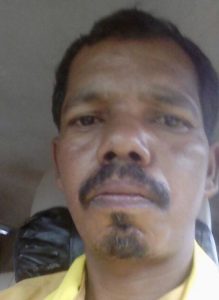
Vimal Marawi of Gondwana Students Union says, “Asur Raj Mahishasur is our ancestor, who is being worshiped as Bhainsasur in every village of Chattisgarh since time immemorial. He is also commemorated as Baigadev in almost all the villages. Mahishasur is worshiped through the Baiga of the village. This tradition has come down from one generation to the next. Every tribal family of Chhattisgarh believes in Baigadev.” He adds, “If the effigies are to be burnt, then there is a long list of rapist babas like Ram Rahim, Asaram and others. These monstrous men must be shown as being slaughtered by Durga and the insult of tribal identity must be stopped. As far as Ravan is concerned, the battle he fought was essentially a battle between two cultures – Aryan and non-Aryan. The non-Aryans include SCs-STs-OBCs. Mahishasur and Ravana were protectors of the ‘Rakht’ culture and that is why they were called Rakshas by the Aryans. However, now we are aware and want that the centuries-old practice of disparaging and insulting our ancestors and kings must come to a stop immediately. Today, even students as young as those in standard 5 are joining the Gondwana Students Union.”
The Gondwana Students Union, is demanding a ban on these derogatory practices, citing Article 15 of the Constitution, which prohibits any form of discrimination on grounds of religion, race, caste, sex or place of birth.
According to Anil Marawi, who is a farmer, “The upper Caste people should stop the portrayal of Mahishasur’s slaying by Durga as a symbol of the triumph of good over evil. The practice of burning effigy of Ravan must also be stopped forthwith. If it is not done, we will be forced to go to the police and the courts. We have already initimated our resolve to the DM in the form of a memorandum, demanding a ban on these practices. Like last year, the Tribal youths have again resolved to boycott ‘Mahishasur Vadh’ and ‘Ravana Dahan’. Their plan is to organize Mahishasur Diwas and Ravana Diwas. Though youth of this area have been organizing ‘Mahishasur day’ and ‘Ravan Puja’ earlier as well, it will for the first time when it will take place under the banner of Gondwana Students Union.
This year, the festival of Durga Puja or Dussehra will be held on 19 October. It will be interesting to see how effective the initiative of the Gondwana Students Union is in this area. Whether they will succeed in getting Mahishasur Vadh and Ravan Dahan banned, only time will tell. Even if this ban is put into effect at a few places, it will be seen as a success.
(Translation: Susmita Mukherjee; copy-editing: Zeeshan Ali)
Forward Press also publishes books on Bahujan issues. Forward Press Books sheds light on the widespread problems as well as the finer aspects of Bahujan (Dalit, OBC, Adivasi, Nomadic, Pasmanda) society, culture, literature and politics. Contact us for a list of FP Books’ titles and to order. Mobile: +917827427311, Email: info@forwardmagazine.in)
The titles from Forward Press Books are also available on Kindle and these e-books cost less than their print versions. Browse and buy:
The Case for Bahujan Literature
Dalit Panthers: An Authoritative History
Mahishasur: Mithak wa Paramparayen
